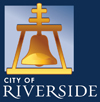California state law SB 1383 requires "Tier One" and "Tier Two" Commercial Edible Food Generators to donate the maximum amount of excess edible food to feed people.
Requirements include:
- A contract or written agreement must be maintained with a Food Recovery Organization that picks up or receives edible food.
- A record must be kept indicating all types of food being donated, pounds donated per month, frequency of donations, and the contact information of the contracted Food Recovery Organization(s).
- Generators shall not intentionally spoil food that can be recovered to feed people (and shall not compost edible food).
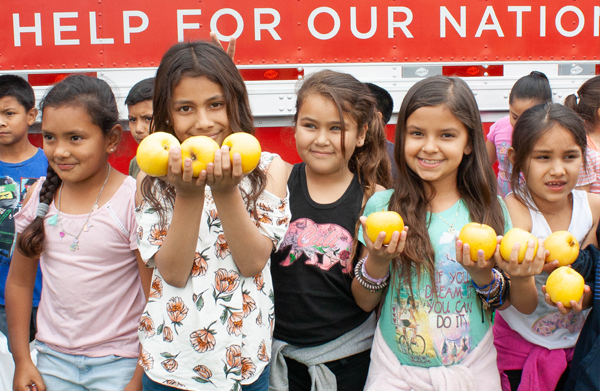
For more information on the requirements for Edible Food Recovery, please refer to the following flyer:
Edible Food Recovery Flyer
To determine if your food generating business is covered by SB 1383, see the definitions outlined below.
Tier One
Deadline for compliance: January 1, 2022
- Supermarkets: A full-line, self-service retail store with gross annual sales of two million dollars ($2,000,000), or more, and which sells a line of dry grocery, canned goods, or nonfood items and some perishable items.
- Grocery Stores: Grocery store with a total facility size equal to or greater than 10,000 square feet.
- Food Service Providers: An entity primarily engaged in providing food services to institutional, governmental, commercial, or industrial locations of others based on contractual arrangements with these types of organizations.
- Food Distributors: A company that distributes food to entities including, but not limited to, supermarkets and grocery stores.
- Wholesale Food Vendors: A business or establishment engaged in the merchant wholesale distribution of food, where food (including fruits and vegetables) is received, shipped, stored, and prepared for distribution to a retailer, warehouse, distributor, or other destination.
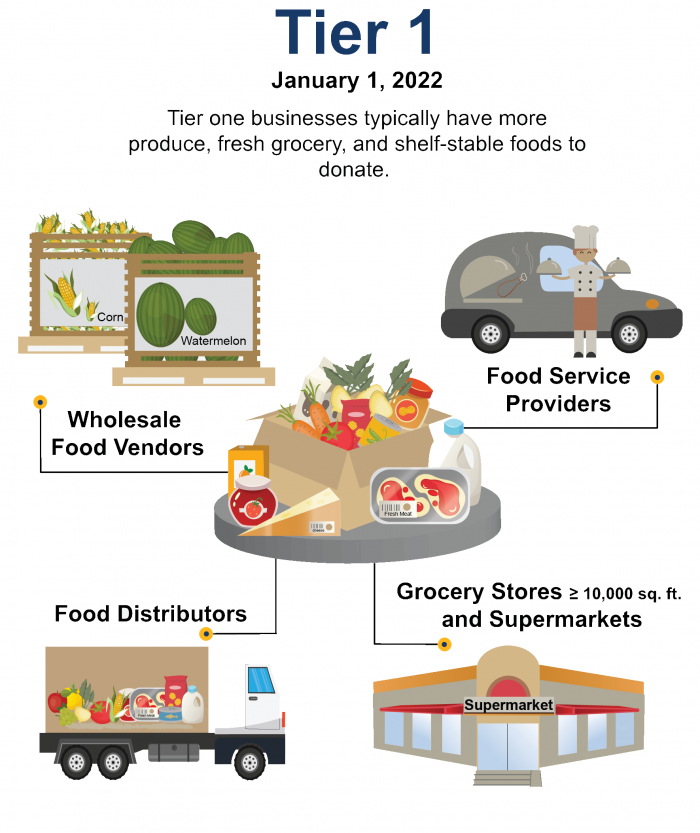
Tier Two
Deadline for compliance: January 1, 2024
- Restaurants: Restaurant with 250 or more seats, or a total facility size equal to or greater than 5,000 square feet.
- Hotels: Hotel with an on-site food facility and 200 or more rooms.
- Health Facilities: Health facility with an on-site food facility and 100 or more beds.
- Large Venues: Large venue means a permanent venue facility that annually seats or serves an average of more than 2,000 individuals within the grounds of the facility per day of operation.
- Large Events: Large events means an event, including, but not limited to, a sporting event, a flea market or a festival, that charges an admission price, or is operated by a local agency, and serves an average of more than 2,000 individuals per day of operation of the event, at a location that includes, but is not limited to, a public, nonprofit, or privately owned park, parking lot, golf course, street system, or other open space when being used for an event.
- State Agencies: A state agency with a cafeteria with 250 or more seats or a total cafeteria facility size equal to or greater than 5,000 square feet.
- Local Education Agencies: A local education agency with an on-site food facility. Local education agency means a school district, charter school, or county office of education that is not subject to the control of city or county regulations.
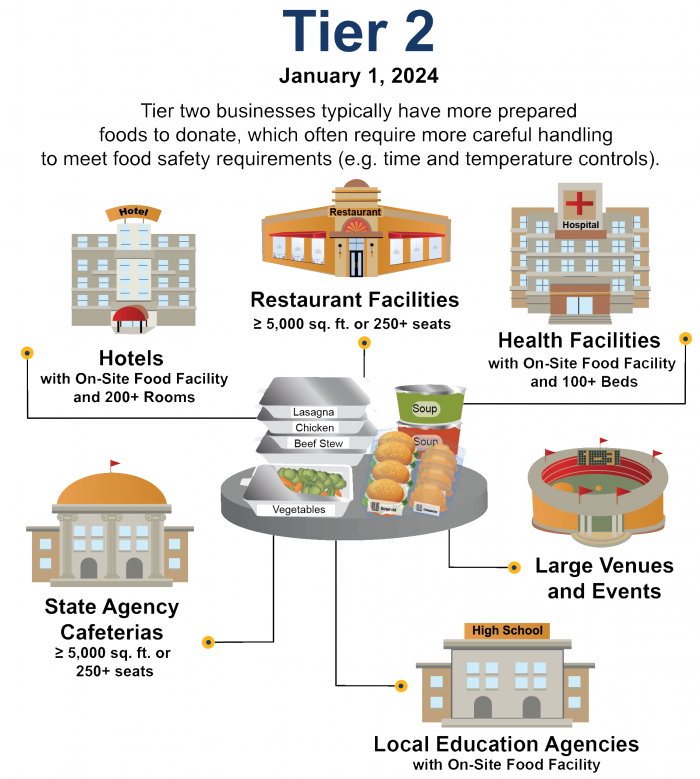
Food Donation
Donating edible food that would otherwise be thrown away is the first step in addressing food insecurity, so the City of Riverside has partnered with Feeding America Riverside | San Bernardino in an effort to alleviate hunger within our community. For more information about free food recovery services provided by Feeding America visit the www.FeedingIE.org.
For more information on food donation, please refer to the following brochure:
Food Recovery Brochure
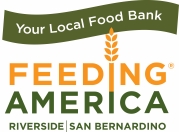
Inspection and Enforcement
Local jurisdictions are required to provide food recovery information and outreach to Commercial Edible Food Generators and inspect and enforce the food recovery requirements of SB 1383. A timeline is provided below to help your edible food generating business develop a food recovery program in compliance with state law.
The City of Riverside is partnering with ReCREATE Waste Collaborative to annually inspect covered food-generating businesses.

| January 1, 2022 | Tier 1 Commercial Edible Food Generator Requirements and Annual Inspections Begin |
| January 1, 2024 | Tier 2 Commercial Edible Food Generator Requirements and Annual Inspections Begin
Tier 1 and Tier 2 Enforcement Begins |
Local Donation Sites
Please visit the Riverside County Department of Environmental Health for more information and a list of donation sites in your area.
